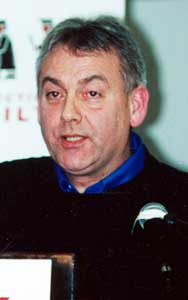5 January 2006 Edition
Interview - Remember them and celebrate their lives

Bik McFarlane
Bik McFarlane, National Hunger Strike Commemoration Committee
"This year, the 25th anniversary of the 1981 Hunger Strike, is not just about remembering and commemorating the ten men who died it is about celebrating their lives.
"They were brave men whose courage and sacrifice should be celebrated in a positive way. Their bravery should be seen as something inspirational, especially in this new phase of struggle when we need to build on our continuing political progress."
So said Brendan 'Bik' McFarlane in an interview with An Phoblacht where he outlined the work of the National Hunger Strike Commemoration Committee in advance of the 25th anniversary of the 1980 and 1981 Hunger Strikes.
The North Belfast republican, who was the OC in command of republican POWs in the H-Blocks during the 1981 Hunger Strike, is a member of the committee tasked by the party to organise the year-long series of events to mark this year's anniversaries.
He was quick to point out that this year also sees the anniversaries of the deaths on hunger strike in English prisons of Michael Gaughan and Frank Stagg.
Gaughan died in Parkhurst Prison on June 3 1974 while Stagg died in Wakefield Prison on 12 February 1976.
According to McFarlane the first events of this year's celebrations will be mark Frank Stagg's death.
"We will start this year's calendar with two events marking the 30th anniversary of Frank's death. A mural, honouring Stagg and Gaughan, will be unveiled on the Falls Road in Belfast on Sunday 12 February.
"A commemoration is also organised for Wakefield Prison itself and we will have people travelling across to England for that."
McFarlane went on to point out that the Stagg commemoration falls on the day before the official launch The National Hunger Strike Commemoration Commit-tee's diary of events for the year.
"We decided on 13 February as the date for the official launch of this year's events because we wanted it to coincide with the Stagg commemoration. We saw it as a way of starting the year of commemoration with some momentum as we want to get all areas across Ireland focused on this coming year's events.
"It is important that we look back on the Hunger Strike period and see it in the context of the political developments of the last 25 years.
"And so given the developments in the struggle since last July we want our activists throughout the country to organise and use the Hunger Strike commemorations as a way of promoting republicanism and of educating people."
McFarlane pointed out that so many people have come to republicanism in the past number of years, and that young activists in particular may not be familiar with the events of 1980 and 1981 so it is crucial that we use the coming year as a way of educating and raising people's awareness of that period.
The former H-Block prisoner also pointed out the irony that because of media censorship and especially the Dublin Government's Section 31 policy which barred republicans from the airwaves people overseas knew more about what was going on in the H-Blocks than a lot of people in Ireland.
"Censorship, in Ireland, had a lot to do with that but there was also the ingrained anti-republicanism that was part and parcel of the 26 County political establishment. We are seeing all this being played out through the antics of the present Dublin Government and Michael McDowell in particular.
"So for those reasons it is important that we use this year's events to bring republican politics to a wider in this new phase of political struggle."
During his interview McFarlane spoke of a recent visit to the H-Blocks in the company of South African Intelligence Minister Ronnie Kasrils and his wife Eleanor who travelled to Ireland in October.
McFarlane explained how Kasrils spoke of how the 1981 Hunger Strikes had a profound effect on the consciousness of the people in South Africa, especially those involved in struggle against the Apartheid Regime.
"The visit with Ronnie Kasrils and his wife Eleanor — who escaped from prison in South Africa — was very moving and profound.
"We were standing in the cell where Bobby Sands died in the hospital wing and I related the story of my first visit back to the cell in the company of a Sinn Féin delegation including Gerry Adams.
"Gerry asked us to gather around the bed and reflect quietly on those ten courageous men who gave their lives for the freedom of our country in 1981.
"That moment brought back the deep sense of loss we all felt in the H-Blocks when Bobby died. It also reminded me of the determination of the other Hunger Strikers to continue in their struggle to defeat Thatcher and the British attempt to criminalise our struggle.
"Ronnie Kasrils then asked those of us who were with him to also gather around the bed. All those in the South African delegation were so moved by the experience and what I think it tells us, as Irish republicans, is that the Hunger Strike was such demonstration of our commitment to be free that it inspired people throughout the world.
"We need to take that inspiration and determination and ensure that this year not only commemorates but celebrates our will to be free, to make politics throughout this island and bring about the dream of national and social liberation that so many of our friends died for."


